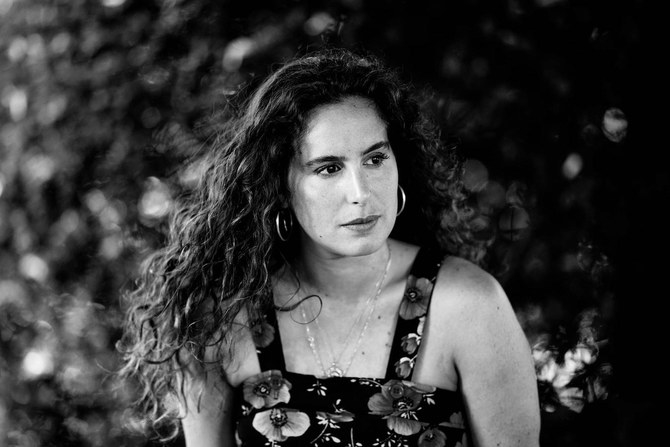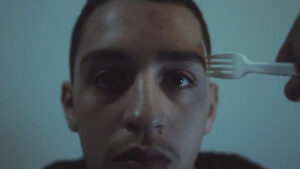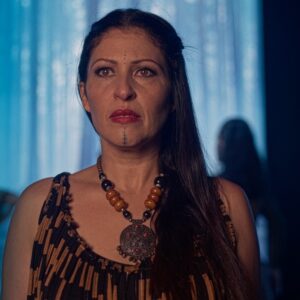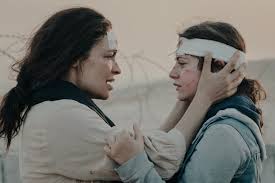French-Palestinian-Algerian filmmaker and actress Lina Soualem is continuing to explore and reconnect with stories of her family by dissecting exile, displacement, and transmission through generations in her new film. This time, she follows three Palestinian generations of women including her mother, actress and director Hiam Abbas, with Soualem as the fourth generation. Through multi-viewpoint personal and public archival footage and pictures, she attempts to understand the challenges and choices faced by the women in her family, allowing them to exist in the place where they were exiled from: the beautiful Tiberias lake.
The Film Verdict spoke to Soualem as her film is currently touring Europe and was selected as the Palestinian entry for the 2023 Oscars at a critical time in the Palestinian-Israeli conflict as tensions and polarisation are at a peak.
The Film Verdict: What motivated you to focus your film on your mother and other women in the family?
Lina Soualem: Bye Bye Tiberias is a continuation of my first documentary film, Their Algeria (2020), which I filmed with my paternal grandparents Aisha and Mabrouk, who immigrated from Algeria to France in the 1950s and divorced at the age of 80 after 62 years of marriage. Through their story, I explore the story of exile and transmission through generations. In the first film, I am the granddaughter who wants to reconnect with the story of her grandparents in the context of the French colonization of Algeria, and the context of silence that existed as my grandparents never told us the story. I wanted to break the silence and find my place between the two countries, Algeria and France, where my family is from and where I was born.
And in Bye Bye Tiberias, I keep on exploring the themes of exile through generations despite displacement. This time, I do it as a fourth generation of Palestinian women who have influenced the world around them and have influenced my mother and, thus, myself. And I ask what my mother transmitted to me, and I go back to the source to see what has been transmitted to her. I am trying to explore exile but through my position as a woman in the family and in the line of women. Also the women in my family have been able to transmit and maintain their legacy and history alive through the power of relations between each other, despite displacement. I wanted to highlight their identities, strengths, and paths and struggles.
TFV: How was it to work with your mother as your subject, especially as she has a professional background with many years in the film industry?
LS: It was not easy at first to work with my mother because she is not used to documentary film settings as a fiction actress. She is more used to fictional sets, so it took a while for her to be at
ease in front of my camera. We had a lot of talks. I filmed for almost six years… But at a point, she understood what I wanted to do, and she let herself go with my process. And she trusted that even when I was looking for something, and I didn’t really know what to do, she let me explore.
TFV: Your mother has always worked in many films that deal with Palestine and the conflict. Did your conversations with her go beyond the merely family aspects? Did you talk about artistic aspects of the film?
LS: She was not part of the artistic process. She didn’t write or participate in the editing process. The artistic decisions were mine. She wanted to stay as a character as she is her own life. She is not acting; she is herself.
TFV: Can you tell me more about the cinematography and camera work? There are shots near Tiberias, in houses, and open shots in landscapes. How did you coordinate the camerawork?
LS: The images in the films are a mix from different times. There is the historical black and white footage that I found in archives, my family footage, which my father filmed in the 1990s via VHS, super 8 footage from my family, and there are images that I shot myself in the first shooting there when I filmed my mother and grandmother together. Then, there are images which are the most contemporary time in the film. In addition, there was footage filmed by Frida Marzouk, a talented French-Tunisian DOP who worked in many great films, and I needed someone with me to do the filmmaking to give a different look each time of the filming. I wanted the landscape to appear differently so we could compare the transformation of the landscape over the years.
And after we had a process of color correction with Christophe Bousquet where we had these different sources of images and wanted to give a homogeneity and uniformity to all these images even though we jump from time and space to another time and space. The idea was for this jump not to be felt. The idea was to float and navigate between the different times and worlds without feeling it too much.
TFV: Your film world premiered in Venice last August and a North American premiere in Toronto in September, which seems like ages ago as rapid changes have appeared in Palestine. Your film is now being screened in Leipzig. It will play in other places in Germany where harsh restrictions exist against raising Palestinian flags or standing in solidarity with people in Gaza. How do you feel about this?
LS: It is great to see the film screened at both those two amazing festivals [Venice and Toronto]. I went there with my mother to defend the film, and it was really amazing, especially to meet the public and see the reaction and see people being able to connect with the stories of these women. In October 2023, I showed the film in London BFI and in DOK Leipzig. I was rather worried about showing the film in these conditions and also because it is a moment of great tragedy and despair, and it was not easy to speak about something so intimate publicly in such a context. But I was very happy about the warm welcome of the audience in London and Leipzig. It gave me hope that the audience might have felt the stories of the women and their humanity, and this allows me to feel that the film allows them to give back the humanity that seems to have been deprived in the media. It is a bit difficult for me to know how the other screenings will go, but I want to keep believing in humanity. The main thing is for people not to have more losses.
TFV: Your film garnered grants and support from El Gouna, Doha, and AFAC (Arab Fund for Arts and Culture). Are Arabic platforms starting to become a major player in international funding of films?
LS: Many Arab film entities supported the first and second films. The Doha Film Institute and many pitching platforms in Algeria, Tunisia, and Morocco supported Their Algeria. Bye Bye Tiberias also got support from the El Gouna Film Festival in Egypt, in the Amman Film Festival in Jordan, AFAC, and Doha Film Institute. So I think it is important to have all these
funds in the regions and all the other funds that exist to be able to fund stories that sometimes are not funded at first in the west, only after a first push from the Arab regions. It is important to have a diversity of funds so all stories can find support depending on what it is about and the interests it gathers.

.png)





